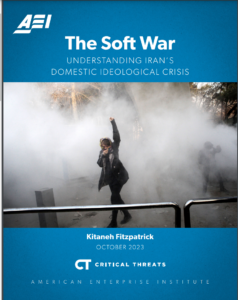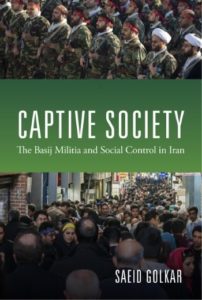 The Islamic Republic of Iran may be gloating* over the Hamas attack on Israel but it has entered a serious domestic crisis that threatens the regime’s long-term survival and that the Mahsa Amini protest movement has deepened, according to a new report.
The Islamic Republic of Iran may be gloating* over the Hamas attack on Israel but it has entered a serious domestic crisis that threatens the regime’s long-term survival and that the Mahsa Amini protest movement has deepened, according to a new report.
Supreme Leader Ali Khamenei has correctly diagnosed the root of the movement as an increasingly insurmountable ideological rift between the regime and Iran’s youth but has chosen to confront his restive people rather than accommodate them, notes analyst Kitaneh Fitzpatrick.
Khamenei has blamed waning regime support on a
so-called ideological soft war that he believes the US
is waging against the Iranian population, especially the youth, she writes in The Soft War: Understanding Iran’s Domestic Ideological Crisis, a report for the American Enterprise Institute:
Khamenei has built and is increasingly reinforcing an ideological infrastructure to counter mounting anti-regime sentiments among Iranian youth. These reactive efforts are multipronged and pervasive; exist at the national, provincial, and virtual levels; and aim to counter Western influence in Iran. Soft war encompasses censoring the internet and media, promoting pro-regime cultural initiatives, increasing control of Iranian educational and cultural entities, and monitoring the population to punish those who fail to adhere to the regime’s stringent ideology.
 Iran’s soft-war policies reflect Supreme Leader Khamenei’s long-held concern that demographic changes and waning revolutionary ideals present an existential threat to the regime’s survival, Fitzpatrick observes.
Iran’s soft-war policies reflect Supreme Leader Khamenei’s long-held concern that demographic changes and waning revolutionary ideals present an existential threat to the regime’s survival, Fitzpatrick observes.
In an effort at “vaccinating Iranian society against ideology or culture deemed incompatible with the Islamic-Iranian identity,” the regime has created and mobilized non-state actors or ‘uncivil society groups’ such as the Basij, she adds, citing Saeid Golkar’s Captive Society: The Basij Militia and Social Control in Iran. RTWT
Iran’s support for Hamas is “about co-opting forces that are willing to shoot at the people that you would like to shoot at, and that essentially explains the Iranian material support to Palestinian terror groups like Hamas and Palestinian Islamic Jihad,” Behnam Ben Taleblu, senior fellow at the Washington-based Foundation for Defense of Democracies think tank, told RFE/RL.
“Iran is an equal-opportunity offender when it comes to supporting both Sunni and Shi’ite, Islamist or jihadist terrorism,” Taleblu explained. “And often, it’s been Iran’s material and financial support to Palestinian Islamic Jihad…and as well as Hamas itself, that has had added this ecumenical color to its export of the Islamic Revolution throughout the Middle East.”
The International Forum’s Sharp Power Research Portal explores how Iran and 4 other authoritarian powers—China, Russia, Saudi Arabia, and the United Arab Emirates—are exerting influence in 143 countries around the world. The Portal catalogues over 1,000 English and foreign language research and reporting resources on authoritarian sharp power in five sectors: media and information; commerce; culture and entertainment; knowledge generation; and technology.
#Iran‘s material support for Palestinian terror groups like #Hamas and Islamic Jihad is “about co-opting forces that are willing to shoot at people that you would like to shoot at,” @FDD‘s #BehnamBenTaleblu tells @RFERL. https://t.co/qeXnmHiSNy
— Democracy Digest (@demdigest) October 10, 2023







